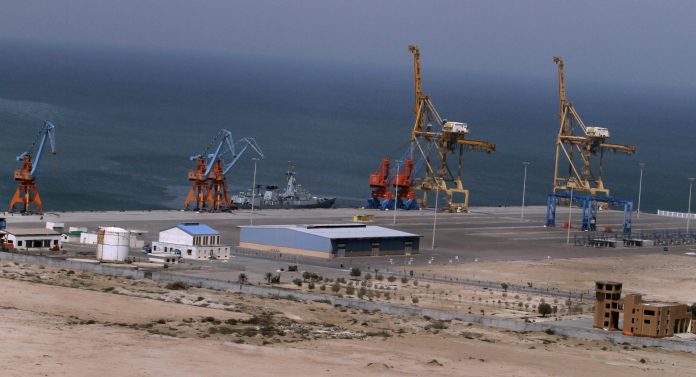The government is expected to exempt the Gwadar Free Zone from the Import and Export Order and the Foreign Exchange Regulations Act to launch a pilot project allowing RMB currency exemptions.
As per media reports, the Cabinet Committee on Chinese Investment Projects (CCoCIP), chaired by Federal Minister of Planning, Development and Special Initiatives Ahsan Iqbal, reconvened to discuss key issues critical to CPEC, including the status of the Gwadar Free Zone.
In the pursuit of making the Gwadar Free Zone more attractive as an export-oriented zone, the committee directed the Maritime Affairs Division to present a concept and definition of a Free Zone, in the context of Gwadar Free Zone, after consulting with the Commerce Division, the FBR and other relevant agencies.
On the agenda were key topics, ranging from exemptions to the Gwadar Free Zone (GFZ) from the Import and Export Order to exemptions from the Foreign Exchange Regulation Act 1947 for these zones.
The committee noted an investor concern regarding the Export Policy Order, 2022 which was preventing them from exporting the final product from a Potassium Sulphate fertiliser plant that they had established. This is due to a ban on fertiliser exports, and such export controls are not uncommon.
Currently, only 5 countries including Belarus, Canada, Morocco, Russia, and the USA control 90% of the world’s exports of potassium-based fertilisers.
Among other issues, the committee also discussed the request of China Overseas Port Handling Company (COPHC) submitted to the State Bank of Pakistan for piloting an RMB settlement in GFZ through an exemption from the Foreign Exchange Regulation Act.
This Act currently controls how foreign currency can be held and used within the country, as well as how it can be remitted or brought into Pakistan. Typically, these regulations are designed to control the flow of foreign exchange to stabilise the local currency and economy
The exemption would allow businesses in the GFZ to maintain USD or RMB accounts with more freedom, bypassing some of the usual constraints imposed by the Foreign Exchange Regulation Act. The goal of this exemption is to enhance the attractiveness of the free zone for investors, particularly those targeting export-oriented enterprises, by facilitating easier and more flexible profit remittance.
On this issue, the committee directed the Ministry of Maritime Affairs to submit a summary in the next meeting after consulting with the Finance Division, the Commerce Division, the SBP, the FBR and other relevant stakeholders.
The Committee also discussed other key issues, including Afghanistan Transit Trade, Electricity in Rashakai SEZ, Karachi Coastal Comprehensive Development Zone (KCCDZ), the Security of Chinese Nationals as well as the International Transshipment of Seafood from International Waters.
On the Afghanistan Transit Trade, the committee noted the impact of the Commerce Ministry Policy, introduced in September 2023, which required a Bank Guarantee for the import of Bulk Cargo. The committee asserted that this had negatively affected transit trade at the port, and considered the request of COPHC to replace this with an Insurance Guarantee.
The committee also tabled another request by COPHC for permission to handle seafood transshipment activities from international waters at Gwadar Port, and noted the sensitivity attached to fishing in Balochistan and the need to consult the provincial government.
The delay in the review of the Investment Framework Agreement of KCCDZ, signed between Karachi Port Trust and China Port and Bridge Corporation, was also discussed and attributed to the court judgement in the case of the reclaimed coast land, which shifted the domain to the province.
The Committee reiterated its commitment to redefining a Free Zone, in the context of GFZ, which should streamline many of these concerns, and directed the Maritime Affairs Division to submit a summary after consulting with key stakeholders.
The committee also carried forward its discussion from its previous meetings to discuss the ongoing delay with the provision of electricity to Rashakai SEZ, one of the nine Special Economic Zones planned for establishment under CPEC. It was emphasised that the Power Division should immediately work with the Developer at Rashakai SEZ and PESCO for an interim measure, while the Power Division and NEPRA confirm the source of permanent supply.
Finally, the security of Chinese nationals in Pakistan was also discussed, which the committee noted as a major barrier to attracting investment. The committee directed the Ministry of the Interior to revisit the SOPs currently in place, as such that the movement of Chinese nationals should not be restricted, instead highlighting the need for foolproof security measures.























